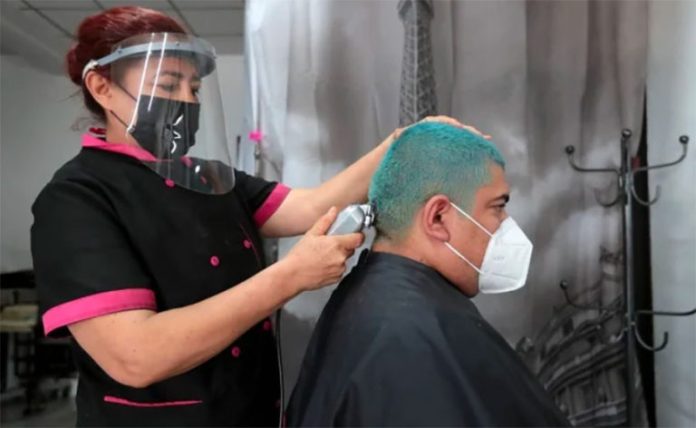You probably heard that a couple of more states have made it into the “green” category of Mexico’s Covid-19 stoplight system. Among them was my state of Veracruz, joining Campeche and Chiapas.
Like many veracruzanos, I felt briefly elated to see that our state was now listed as green. At last! Could my daughter return to her classroom? Could I safely see a movie in a movie theater? Could I pull my mask down once in a while to breathe fresh air?
Those thoughts began fading almost immediately when I began reading the fine print, which made it clear that we were still in it for the long haul and would need to keep up our current precautions.
Fine. I can keep wearing my mask and continue to maintain my distance and at the very least feel guilty for doing anything that is not absolutely necessary in the same general space as people who are not in my household, which is basically me and my kid.
But really, what does green mean to you? One thing that I know for sure is that most people — especially tired, fed-up people — are not super great at reading the fine print. I’m not super great at it, and it’s basically my job. Besides, the color green doesn’t mean “proceed with caution,” it means “all systems go.”
A closer look at my green state’s map showed that almost every municipality was either yellow or orange, except for a very few rural handfuls. Only 11 of the state’s 212 municipalities were green for the week ending December 6.
There’s no visual map yet for the week ending December 20, but there is a chart in which slightly over one-third are in green — though the reality is few of them are major cities. How is it possible that the whole state can obtain that sought-after color designation while almost all of its major population centers are in yellow and orange?
The mismatch between the overall state rating and the individual municipality ratings, to me, makes no sense. Add in the fact that Mexico City Mayor Claudia Sheinbaum and Deputy Health Minister Hugo López-Gatell have both said not to pay too much attention to the stoplight system, and we really have a problem of both messaging and design.
Let’s narrow our view a bit now and look at my municipality of Xalapa, which is currently in orange.
The nice mall — well, the newest, most popular mall — is open. It’s been open. So are the smaller malls from what I can tell. I haven’t been since before the pandemic started, but when I pass by that newest mall, I notice that the parking lot is always at least three-quarters full, surely necessitating more than the 30% of personnel recommended by the “orange light” designation.
You might think that the many outdoor places where we used to typically spend our Sundays were open to the public, to encourage safer activities, but you’d be wrong. City parks and playgrounds are cordoned off with yellow “caution” tape.
While it’s probably not the best idea to spend all of one’s time in a crowded park, I hardly see how the enclosed space of a mall has been deemed safer.
Also, can I just say this again? It makes me so mad that government functionaries are behaving as if their hands were tied when it comes to the economy.
“OK, we’ll tell people to stay home, but pobrecitos, how will they earn money to eat if they don’t work? Wouldn’t it be cruel not to allow them to earn money? How are they supposed to eat and pay rent?”
Grr and grr again, government. As if we didn’t have the ability to help people not starve. Meanwhile, criminals are making a bigger show of helping those in need than you are. Criminals. If they can do it, so can the government. I mean, really.
As Paul Krugman stated perfectly in a New York Times editorial last week, monetary help for individuals and families to follow the suggestions for keeping themselves safe at this point isn’t “stimulus,” it’s “disaster relief.”
It is the height of cynicism and cruelty for the powers that be to behave as if they were powerless to help anyone economically and have no choice other than to let people endanger themselves for a job.
That said, I let go of my hope for any kind of economic help for average workers long ago.
“It’s up to state health authorities to make the most convenient decisions to balance social mobility, activate the economy and reduce the number of cases,” López-Gatell said almost a month ago at a press conference.
Which perhaps reveals that the stoplight system, in the end, is mostly about the economy, i.e., “This is how you’re allowed to keep it going, but if you can opt out, please do. But, also, please don’t let the economy go down the drain.”
Fine.
But make it clear that it’s for the benefit of the economy and not for people’s health. And, for goodness sake, get rid of the green until it actually means we’re virus-free.
Sarah DeVries is a writer and translator based in Xalapa, Veracruz. She can be reached through her website, sdevrieswritingandtranslating.com.
